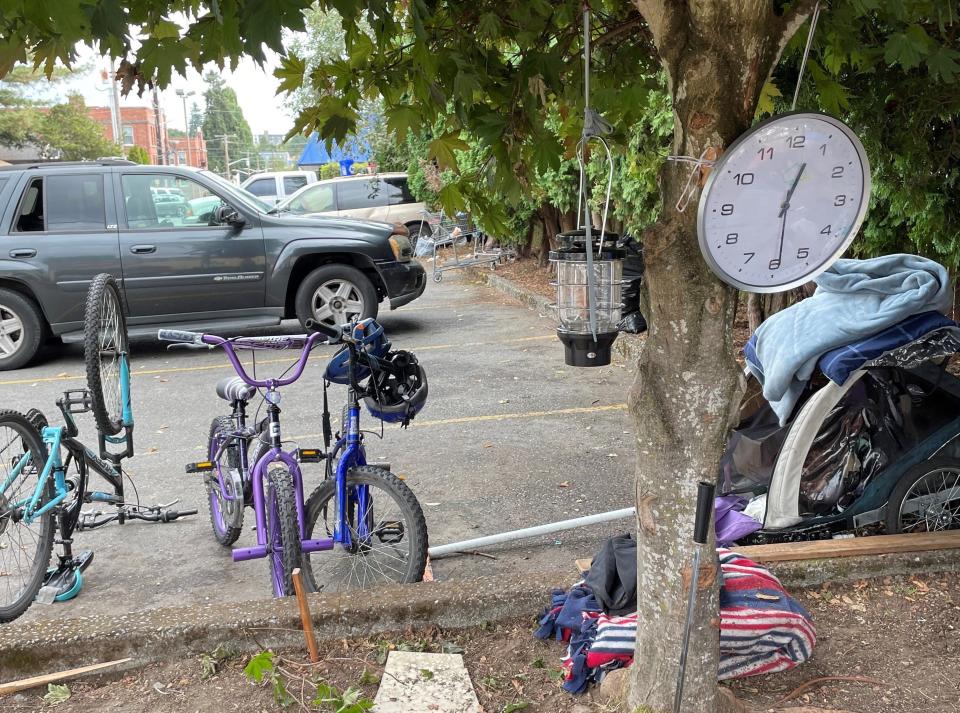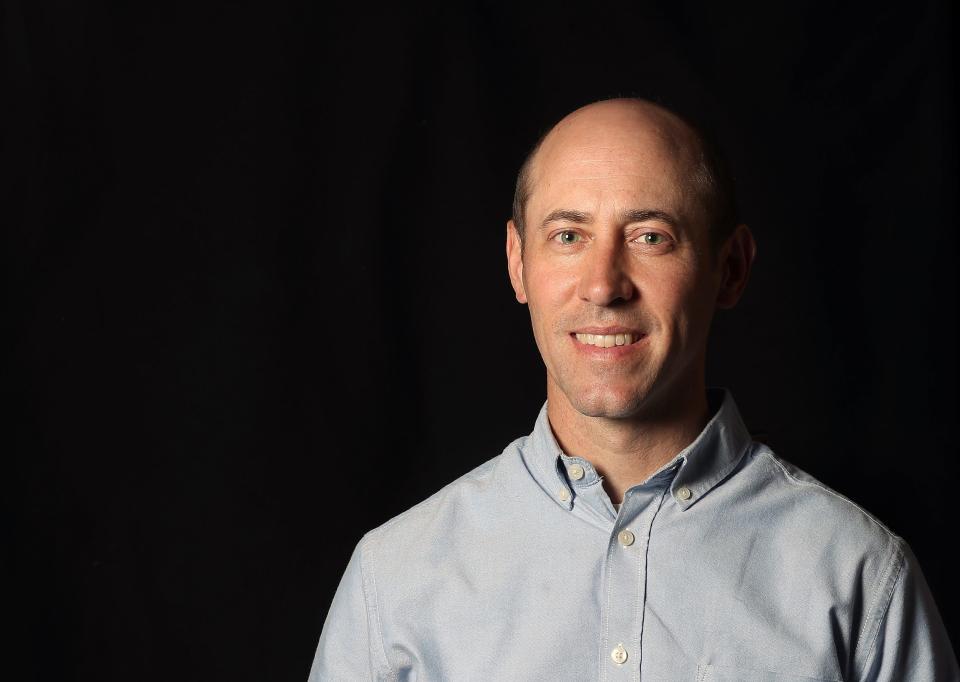The two bicycles I can't forget
I want to make the case that the Bremerton City Council's misguided attempt at spreading homeless encampments to potentially two dozen sites around the city backfired brilliantly.
I mean brilliant not for anything directly productive, but for how that move -- which was walked back on paper before this week's vote -- catalyzed so many residents around a crisis that seems to be crystalizing in the public eye. As reported by our Kai Uyehara, Wednesday's council meeting may have had the most input of any in three decades due to that issue on the agenda.
It was an image that I saw Tuesday that struck me more poignantly than anything else, however, and through the week it would not let go. It's a photo from Broadway Avenue, behind the Starbucks and Burger King, where a small encampment has grown up over the past month. It's the one where people snicker about a sign reading "Wheelerville," a neighbor's comment on city leadership during the time the encampment issue has exploded.
The photo was of two kids' bicycles, side by side, helmets hung on the handlebars and parked by a tree, where someone hung a clock, the type you'd typically see in an office or a school classroom.

The bikes now belong to children, one in elementary school and the other in middle school, I've since learned, who have been living there with their parents. After being called to respond Child Protective Services provided the bikes, but the children remained, according to homeless advocates who got involved. A community member bought the helmets, and CPS hung the clock on a tree limb. So the kids would know when it was time to go to school.
Let that sink in. During a month when people around Bremerton expressed alarm for their children's safety because the council suggested that unauthorized camping would be allowed near some residential neighborhoods, at least two children were actually living in one of those encampments.
I'm not calling those residents hypocritical, to be very clear. It's not unreasonable at all to worry about what an encampment can potentially bring. Ask the advocates with groups like Rock the Block, who daily are checking in those encampments to feed people, provide portable toilets, maybe direct them toward rehab. They know drug use and drug dealing, violence, sex offenders and other danger exists in the tents along Broadway or MLK Way.
But I hope the image of the bicycles grabs the attention of those who are following the issue. It should grab hold and give us a good shake as Bremerton, ideally with help from other municipalities, attempts to thread the needle of caring for the less fortunate or the addicted while maintaining a city that's safe, clean and healthy. It sure seems like the opportunity is ripe to engage a wider range of minds and voices in the solution.
"It takes an entire community," Dawn Michele Wilson emphatically told me, as she relayed the details of what led the children and their parents to Broadway Avenue.
The story behind the photo is one that encapsulates the uphill climb toward addressing just the symptoms of this crisis, before we even get to the larger, societal issues at its core. Despite the parents' struggle with addiction, CPS wouldn't remove the children, Wilson said. There wasn't immediate available housing assistance through Kitsap Community Resources. The county's HEART team visited, Bremerton police checked in, the Kitsap Rescue Mission had no available rooms and Rock the Block simply didn't have enough money from donations to rent a hotel room temporarily.
"All of us have been working together, trying to find a solution," Wilson said, noting that at least 30 individuals lost sleep during the week trying to help the family. "We felt this shared urgency that there's really nothing we could do."
The image remained stuck in my mind, but I also know those aren't the first kids to be homeless and living outside, nor the last, and not even the only ones in Kitsap County as I write this. Let those two bikes and a surreal clock on a tree speak for all of them, as well.
Coffee Oasis is a 26-year-old organization that most here are familiar with, for the work it does with teens who end up homeless. It was founded by the late Dave Frederick and his wife, Cindy, by simply allowing kids into their home, where they were raising their own children as well. That story is well known, and the organization, now run by Dave and Cindy's son Daniel, is one of those notable cases of how to make a difference. There's no question hundreds of lives have been changed because Coffee Oasis exists.
Daniel Frederick now oversees a Coffee O youth shelter in Tacoma that has no vacancies and one in Bremerton that paused its overnight accommodations two weeks ago due to a lack of staffing. So I asked him where he finds optimism when the crisis seems intractable and the tools to fix it so inadequate.
He admitted the factors leading to the temporary closure in Bremerton, particularly within the context of growing encampments in the blocks nearby, caused him to question why he's still at it. He's answered his own question with a simple reminder: "It's the right thing to do." Daniel said the Coffee Oasis staff celebrates milestones and progress and is buoyed by both what they witness and the potential they can't see right away.
"You don't know when their story will intersect with hope," Frederick said when I told him about the gift of bicycles to a couple of kids who sleep on a sidewalk. The family may remember, despite it all, that someone showed kindness. And maybe that makes a difference this weekend, or in five years, or in 20.
That's similar to the story of what drives Wilson, who's worked with several social service providers during her career and keeps grinding because someone once showed such compassion to her during a tough time.
"I get my hope when I see the light come back to somebody's eyes," she told me when I asked how she does it, her voice cracking as she described the children on Broadway. "Because hope is contagious."
On Thursday, during her course of work visiting encampments, four individuals approached Wilson or another team member and asked for a ride to a detox facility, ready to kick their addiction, she told me. One was driven by a volunteer to Everett, another to Longview, another to Tacoma. That's because we don't have a facility anywhere in Kitsap. Those of you who want to spend time thinking about solutions to the current mess, especially those who may be in elected office, could start there.
And the kids?
That same day Wilson met with Capt. Dana Walters of the Salvation Army. Sally's budget for hotel vouchers is empty, but Walters dipped into other agency funds to create a voucher for a ten-night stay and quickly offered it. Both parents agreed to enter detox and seek treatment for their addiction, one right away, and they began packing.
"I can't wait to lay in a bed and watch movies and eat popcorn," Wilson said one of the kids told her after hearing the news. Her voice cracked again. Mine did too.
One feel-good story doesn't solve the problem. It doesn't make a difference to the new city ordinance, it doesn't add a dime of funding for Rock the Block or the Salvation Army, it doesn't mean the temporary shelter to open in just about a month will be any less busy. It doesn't guarentee the parents will make it through the rehab process, and it doesn't answer what happens after ten days. But it can teach us something.
"You love people, whether they succeed or not," Dana Walters told me on Thursday night, when I asked where she finds the strength to do a job few others want and with a varying rate of success. Her husband Lance added that their faith in God is key, which I'd assumed since the couple also leads a church that meets at Sally's. He said their personal needs and the needs at the Salvation Army are always met, and that's a continual reminder to help others.
"They're very much a family," Lance Walters said about the four headed for a ten-day hotel stay, noting the excitement one of the children had because the bicycle, the first the child has ever had, is purple, a favorite color. "They're just struggling."
Like it or not, their struggle is ours as well. But the story from the week illustrates a reason to hope, and that the work can pay off, and that maybe it’s worth it for you to find some path to contribute.
Frederick told me he's glad to see how much time Bremerton's city administration and city council have spent on this issue. It means that perhaps more may result than just sympathy or virtue-signaling that we should care for the poor. Maybe more people, like all of those who've sounded off in emails or a city council meeting or those who sat on the dais and listened to the concerned citizens, will really lean in.
But be realistic when you do, Frederick reminded me. I’ll let his words remind you, too: "Buckle up, because it's very long-term work."
David Nelson has been editor of the Kitsap Sun since 2009. Contact him at david.nelson@kitsapsun.com.
To financially support Rock the Block, visit its Facebook page or make a donation to the nonprofit Gather Together Grow Together with a note indicating Rock the Block. To donate to Salvation Army of Bremerton, visit https://bremerton.salvationarmy.org/bremerton_corps.

This article originally appeared on Kitsap Sun: The two bicycles I can't forget

